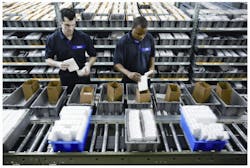New logistics needs will drive more global M&A activity
In a conference call hosted by Wall Street investment firm Stifel Nicolaus & Co., John Manners-Bell (at right) – founder and CEO of consulting firm Transport Intelligence, Ltd. – argued that major global logistics providers, especially those in North American and Europe, will increasingly need to diversify their offers to protect revenues and profits.
“One reason is that we’re seeing major growth of the middle class in developing markets and they desire more high value goods,” he emphasized.
“To get those goods to them will require more sophisticated supply chain services, which is why I expect we’ll see more merger and acquisition [M&A] activity in the logistics space,” he added.
Manners-Bell expects several other trends to also drive further M&A efforts among logistics providers, including:
- The need to move forward with geographic diversification and the addition of complementary service offerings and/or technologies;
- Harnessing acquisitions in order to “flesh out” service offerings in developing geographic markets;
- The desire by major express/parcel companies such as FedEx Corp. and United Parcel Service to further penetrate e-commerce driven “last mile” delivery markets;
- The demand by manufacturers and retailers alike for more sophisticated information technologies, which logistics firms can most easily obtain via M&A efforts;
- Coping with shifting retail business models in Europe due to the emergence of discount stores; in Europe;
- Near-shoring of manufacturing activity that may require global logistics providers to acquire more “localized” capabilities in neighboring countries as logistics flows become more intra-continental and less inter-continental.
“As time goes on, many manufacturers are going farther afield to find for lower-cost production areas,” he explained. “Thus, in Asia, we’re seeing a shift in manufacturing out of China to neighboring Burma, Laos and Vietnam.”
Manners-Bell added that logistics–focused M&A activity seems to be statistically correlated with economic growth; a trend he said is especially true in developing countries of late.
Yet it is the “dramatic change” being wrought by e-commerce that will really alter global logistics strategies and thus M&A efforts, Manners-Bell pointed out.
“I could give five presentations about the impact of e-commerce on logistics alone,” he said during th“It calls for a completely different set of logistics capabilities, serving the B2C [business-to-consumer] supply chain,” Manners-Bell stressed. “It’s not just about delivering goods to a house; that ‘last mile’ may also be to a storage locker. You have to be far more agile to serve this [e-commerce] market and that’s why the big [logistics] companies will be seeing to acquire smaller, more nimble players.”
As a result, he said that U.S.-based logistics companies may increasingly become acquisition targets for European and Asian-based logistics companies, despite the strong U.S. dollar, emphasizing that asset-light logistics companies are being viewed as less risky investments by potential international buyers.
“Thus, asset-light transportation and logistics companies in the U.S. could be much more viable M&A targets in the near-term,” Manners-Bell stressed.
He added, too, that the impact of “disruptive technologies” on global supply chains can’t be overlooked, either.
“The ‘Internet of Things’ for example is going to provide a whole new level of data that will give shippers far more power and control,” Manners-Bell cautioned. “So third party logistics companies must develop systems in house to deal with that data or buy that capability though an M&A deal.”
About the Author
Sean Kilcarr
Editor in Chief
Sean Kilcarr is a former longtime FleetOwner senior editor who wrote for the publication from 2000 to 2018. He served as editor-in-chief from 2017 to 2018.


